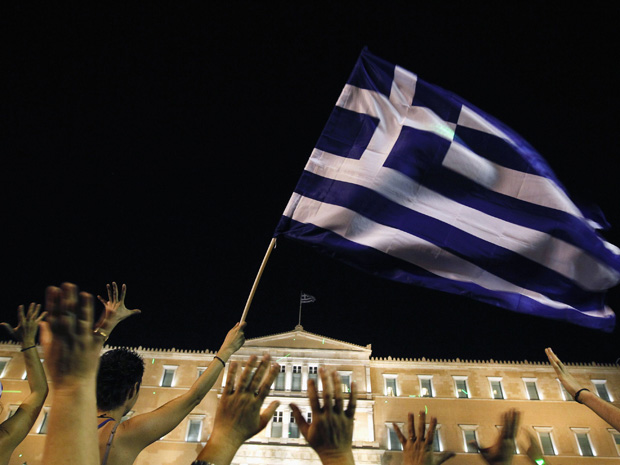
Greece’s hopes of securing a €130bn rescue package have been set back after eurozone finance ministers responded with scepticism to Athens’s pledge to slash public spending to the bone under austerity measures from the rest of Europe.
Athens / NationalTurk – With the clock ticking on a possible sovereign debt default by Athens within weeks, eurozone finance ministers postponed a decision on Greece’s rescue until next week, piling the pressure on the Papademos government. Creditors demand to see action on new pledges as sovereign debt default looms in weeks if rescue package is withheld.
Evangelos Venizelos, who is the Deputy Prime Minister, stated yesterday that Greece’s eurozone fate would ultimately depend on the decision Samaras takes on the bailout over the weekend, as the Greek parliament prepares to vote on new austerity measures amid a general strike and widespread anger over growing poverty.
Greece saved from bankruptcy again, still more than €14bn in debt
Following weeks of brinkmanship that have poisoned relations between the bankrupt country and its eurozone creditors, the ministers and senior officials from the eurogroup, the European central bank, the European commission, and the International Monetary Fund voiced exasperation with Greek delaying tactics.
The meeting in Brussels declined to activate the bailout to prevent an outright Greek insolvency by the end of March when the country has to redeem more than €14bn in debt.
The Greek finance minister, Evangelos Venizelos, left the Brussels meeting reportedly stating that his country now needed to decide whether or not to remain in the single currency.
Despite announcements earlier that the coalition government in Athens government had yielded to savage new terms from the Troika qualify for the bailout, the eurozone finance ministers were unimpressed. The emphasis was on first getting Greece to deliver its side of the bargain.
“On the condition that the Greek parliament takes decisions on the prior actions over the coming days, then next week we can finalise decision on the overall package,” said Olli Rehn, the European commissioner for monetary affairs.
“It’s up to the Greek government by concrete actions through legislation and other actions to convince its European partners that the second [bailout] programme can be made to work.”
Luxembourg’s prime minister, Jean-Claude Juncker, the president of the eurogroup called Troika, announced that the ministers would reconvene next week to review Greece’s conduct and possibly sign off on the new rescue plan.
The Greek government still had to close a €325m funding gap before it would qualify for a new bailout.
“Not everything that we need is on the table,” said Juncker.
Greece vs Germany : Press in both countries battle in headlines
Earlier Venizelos had demanded a conclusion to the bailout plan, but ran into stiff reservations from the key creditor country, Germany. “We finally have a staff level agreement for a new, strong and credible programme,” said Venizelos. “We also have a deal with the private creditors on the basic parameters. We now need the political endorsement of the Eurogroup for the final step.”
Greece and German newspapers battle eachother over the Troika rescue plan in headlines. Germany accuses the greece politicians and the technocrats for being incompetent, since Greece has fallen deeper into recession after it received a first bailout in May 2010.
Amid a mounting sense of despair over Greece, any deal that might be struck may already prove inadequate to its purpose.
The Greek government also faces growing dissent from the majority Socialist Party, which has seen its support in the opinion polls drop to single figures.
Unions called a 48-hour strike overnight in opposition to the cuts, while Deputy Labour Minister Yiannis Koutsoukos, who quit yesterday, accused EU debt inspectors of using “shameless and blackmailing tactics”.
With unemployment soaring in Greece, revenue sources drying up, recession deepening, and social unrest increasing, there is pessimism and resentment on both sides, a sense that the austerity cannot work, and that a default is more of a question of when, not if.
“Just because Greek leaders have agreed on targets does not mean that they will or indeed can be delivered,” said Sony Kapoor of Re-Define, an economics thinktank in Brussels. “We have just reached a temporary truce. The war will continue to be fought for some time to come.”
The €130bn, even if agreed, is unlikely to be enough to achieve the goal of returning Greek debt to sustainable levels, given the country’s deteriorating fiscal position.
Mario Draghi, the ECB’s chief, and Christine Lagarde, the head of the IMF, attended the Brussels meeting of eurozone finance ministers. European commission sources said a signed memorandum committing the Greek government to a further €3.3bn in savings – which still has to go through parliament in Athens this weekend – had to be delivered within five days to meet the tight deadlines for avoiding a Greek default. If a deal is struck on the new bailout, the IMF will need to rule that the arrangement will eventually render Greek debt levels sustainable.
[adrotate group=”16″]

